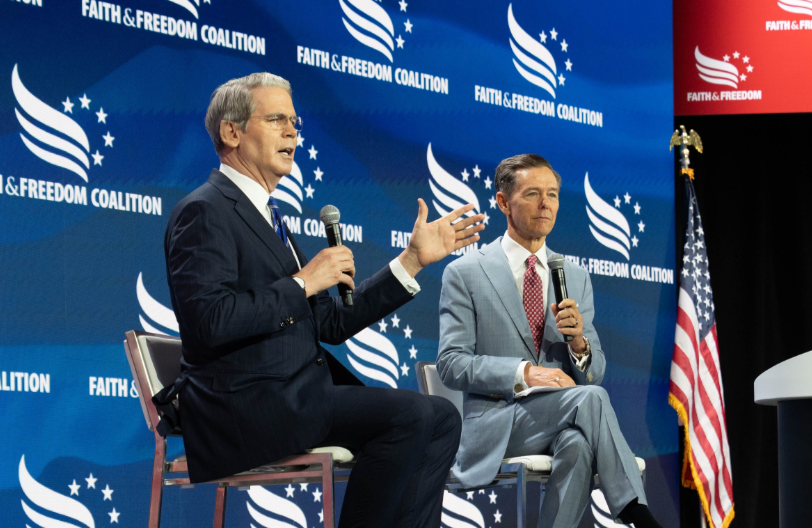Who Will Be the Next Fed Chair:US Treasury Secretary Scott Bessent opened up about the Trump administration’s aggressive economic strategy — from the looming August 1st tariff deadline to the sweeping immigration reforms in the “One Big Beautiful Bill.” He also addressed growing speculation about who might replace Fed Chair Jerome Powell, hinting at the White House’s desire to influence monetary policy sooner rather than later. With trade tensions heating up and economic restructuring on the horizon, Bessent laid out how the administration plans to boost American wages, pressure global trading partners, and reshape the Federal Reserve’s future.
Who Will Be the Next Fed Chair? Treasury Secretary Scott Bessent Weighs In on Trump’s Tariff Deadline
US Treasury Secretary Scott Bessent discusses the Trump administration’s latest policy agenda, including the much-debated “One Big Beautiful Bill,” the renewed tariff strategy, and tensions with key international trading partners. The conversation also touched on the Federal Reserve and speculation surrounding its leadership.
Bessent began the discussion by explaining the core premise of the bill, emphasizing the need to end illegal immigration as a way to redirect an estimated $249 billion in annual wages currently paid to undocumented workers. He argued that enforcing existing immigration laws would shut down the black market for illegal labor and effectively lead to a “massive pay raise for the working class.” He strongly dismissed the notion that higher wages would necessarily be passed on to consumers as increased costs.
Instead, he blamed decades of unchecked immigration for suppressing working-class wages and insisted that reversing this trend could restore opportunities for American workers, particularly men aged 16 to 35, who he said had dropped out of the workforce due to economic and mental health issues.
He further explained the concept of what he called “parallel prosperity,” where both Wall Street and Main Street benefit together — a key philosophical element of the administration’s bill. Bessent suggested that the narrative that illegal immigration doesn’t impact the domestic workforce has been disproven, with economists now admitting that basic supply and demand applies to the low-wage labor market too.
However, skeptics have raised concerns that there may not be enough idle American workers ready to fill these roles, even if they become available. Referencing analysis from the libertarian-leaning Cato Institute, Bream noted that the US labor market remains tight. But Bessent countered that Americans would indeed take these jobs — at the right price — and pointed to a broader revitalization strategy that includes peace deals, trade reforms, and tax changes to reinvigorate the job market.
On the topic of tariffs, the discussion turned toward President Trump’s looming deadline of August 1st for the imposition of new tariffs, with letters reportedly being sent to key trading partners as a final push toward renegotiation.
When asked if there was a pause in the July 9th deadline, Bessent denied any such delay, instead describing the current phase as “congestion” in the final stretch. He praised Trump’s negotiation tactics for generating maximum leverage, forcing international partners back to the negotiating table.
Addressing criticisms from institutions like Goldman Sachs and JPMorgan Chase — who estimate that the tariff plans could cost US employers $82.3 billion and predict companies will pass 60% of those costs to consumers — Bessent pushed back hard.
He labeled these concerns as part of what he called “tariff derangement syndrome,” arguing that real-world data shows no measurable inflation yet. He distinguished between general inflation and temporary price adjustments and claimed that many manufacturers in Southeast Asia are absorbing tariff costs instead of passing them on.
The EU’s position was also discussed. Despite their threats of retaliatory tariffs, Bessent insisted that the US has greater leverage, citing America’s role as a deficit country while the EU holds a significant trade surplus. He said the bloc’s economy is more export-dependent, giving the US an upper hand in negotiations. Recent talks have become more productive, he said, with several national leaders engaging after President Trump proposed a 50% tariff threat.
On Japan, Bessent acknowledged the difficulties but attributed them to political timing, specifically Japan’s upper house elections scheduled for July 20th. He expressed optimism that post-election, significant legislative movement may follow.
The conversation then shifted to Federal Reserve Chairman Jerome Powell. President Trump recently referred to Powell in unflattering terms, fueling speculation that he may soon announce a replacement, despite Powell’s term not ending until May next year. Reports suggest the administration may want to install a “chair-in-waiting” to steer expectations ahead of time.
While Bessent remained coy about whether he could be that person, he likened Trump’s strategy to basketball coaching styles. Comparing Trump to the fiery Bobby Knight, as opposed to the calmer Dean Smith, Bessent said aggressive tactics sometimes work best — and pointed out that Knight won more championships.
Regarding potential disruption from Fed board members voicing differing views, Bessent shrugged off the concern. He pointed out that there are already several vocal board members, and having a prospective chair weigh in early wouldn’t be unusual or harmful.
As the interview wrapped up, Bessent reinforced the idea that the administration is pushing ahead with a clear economic vision: reform immigration enforcement to benefit the American working class, use tariffs as leverage to secure better trade terms, and bring real manufacturing and wage growth back to the country.
Disclaimer:
This article is based on a public interview with US Treasury Secretary Scott Bessent and represents his views as expressed during the conversation. The economic outcomes discussed are subject to change based on future policy implementation, market response, and global conditions.

